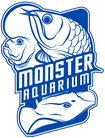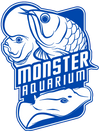Starting your first aquarium is exciting, but choosing the right fish makes all the difference. At Monster Aquarium, we’re here to help you build a tank that’s not only beautiful but also easy to maintain. If you’re just getting started, the best approach is to stick with hardy, low-maintenance species that don’t need a lot of special care. These beginner-friendly freshwater fish are perfect for creating a vibrant and stress-free setup.
Betta Fish: Colorful and Independent
Betta fish are a go-to favorite for new hobbyists. They’re known for their bold colors and flowing fins, and they don’t need a lot of space to thrive. You can keep a single male Betta in a small tank (at least 5 gallons), and with regular feeding and water changes, they’ll do just fine. They don’t need a filter with strong flow, which makes them ideal for low-tech setups.
Tip: Avoid putting Betta fish with other aggressive or fin-nipping species. They're best kept alone or with calm, bottom-dwelling tank mates like snails or shrimp.
Guppies: Active and Low-Maintenance
Guppies are fun to watch, come in many colors, and get along well in groups. These small, active freshwater fish are incredibly resilient and easy to care for. They don’t require much beyond clean water, a balanced diet, and a warm environment.
If you’re looking for a peaceful community fish that breeds easily and adds nonstop motion to your tank, guppies are a solid choice.
Mollies and Platies: Peaceful and Adaptable
Both Mollies and Platies are peaceful freshwater fish that work great in community tanks. They handle changes in water conditions better than most species and are easy to feed. They’re also livebearers, meaning they give birth to free-swimming fry—something many beginner aquarists enjoy observing.
Just be sure your tank has enough plants or hiding spots if you want to protect the fry from being eaten by the adults.
Tetras: Small But Full of Energy
Tetras, like Neon or Ember Tetras, are tiny but pack a visual punch when kept in schools. They feel safest and behave more naturally in groups of six or more. These fish prefer stable water conditions and slightly acidic water but are pretty forgiving overall.
They add movement and color to mid-level areas of your tank and make excellent companions for other peaceful species.
Goldfish: The Classic Favorite
Goldfish are often seen as beginner fish, but they do need plenty of space. Avoid the common misconception that they’ll thrive in bowls. In reality, they need a proper aquarium with good filtration and space to swim. A single fancy goldfish needs at least 20 gallons, and more space is better.
The good news? They’re super hardy, and if you keep their tank clean and don’t overfeed them, they’ll reward you with years of interaction and personality.
Where to Find Quality Freshwater Fish
Looking to get started with these beginner-friendly fish? Stop by Monster Aquarium—we're not just another aquarium store near you. Our team is passionate about helping you succeed. We carry a full selection of freshwater fish and all the accessories you need to set up and maintain your tank the right way.
FAQs
Q1: What size tank is best for beginners?
A1: Start with at least a 10 to 20-gallon tank. Larger tanks are actually easier to maintain because water conditions stay more stable.
Q2: Can I mix all these beginner fish together?
A2: Most of them get along well, but always check compatibility. For example, Betta fish shouldn’t be housed with other flashy or aggressive species.
Q3: How often should I clean the tank?
A3: Do a 25% water change every week. Clean the filter monthly and remove any visible waste during regular maintenance.
Q4: Do I need a heater for freshwater fish?
A4: Yes, especially for tropical species like Guppies and Tetras. Goldfish, however, prefer cooler water and usually don’t need a heater.
Q5: How do I know if my fish are healthy?
A5: Look for clear eyes, smooth swimming, and good appetite. Dull color, clamped fins, or erratic behavior may signal stress or illness.



